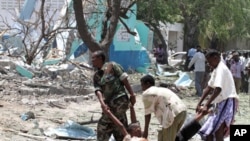The United States says international famine-relief efforts in Somalia will not be derailed by the suicide truck bombing in Mogadishu by al-Shabaab militants Tuesday that killed more than 70 people. A senior U.S. aid team is being sent to the region to try to assure humanitarian access to Somalia.
The bombing outside a building housing several ministries of Somalia’s Transitional Federal Government, the TFG, was said to be the largest since al-Shabaab launched the insurgency in 2007.
It drew an angry response from the White House, which condemned what it termed the “despicable and cowardly” act, and said the al-Qaida affiliated militant group has nothing to offer the people of Somalia except murder and destruction.
Watch video of the explosion and the immediate aftermath. Warning: contains some graphic images.
Al-Shabaab had recently pulled most of its fighters out of Mogadishu, allowing TFG and African Union troops to take control of most of the capital and provide access to aid groups battling the regional famine.
Somali President Sheikh Saharif Ahmed said the attack, could not have come at a worse time for the country, and other TFG officials said they feared it might drive aid agencies from Mogadishu.
But a White House statement said the United States and other donors will continue to provide relief aid and will work to save lives, “while standing against those who deny the basic dignity of the Somali people.”
State Department Spokeswoman Victoria Nuland said the “vicious act” by al-Shabaab, which killed a number of children, was at least in part aimed against the international relief presence. “This is designed to strike fear in the hearts of Somalis and also to intimidate the international community. We will obviously continue our relief efforts. But the world needs to know that it is al-Shabaab that bears responsibility for the fact that we cannot get to all the people in need," she said.
Al-Shabaab has barred most aid workers from the areas it controls in southern Somalia and has tried to forcibly prevent needy people from fleeing the famine zone. The United Nations has warned that as many as 750,000 Somalis could died by year’s end if humanitarian aid does not arrive.
Late Tuesday, the State Department said Secretary of State Hillary Clinton is sending a high-level team to Kenya and Ethiopia to demonstrate what was termed the United States’ “stalwart” commitment to provide urgent famine aid.
The team led by U.S. Agency for International Development Administrator Raj Shah is to meet with government officials and aid workers to discuss impediments to aid deliveries inside Somalia, and in border camps housing hungry Somalis in Ethiopia and Kenya.
The United States, the largest-single donor to Horn-of-Africa relief efforts, has committed some $650 million to emergency aid and sustainable agriculture programs in the region.




